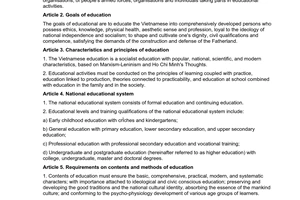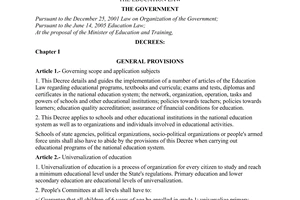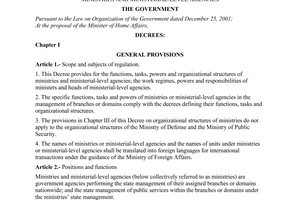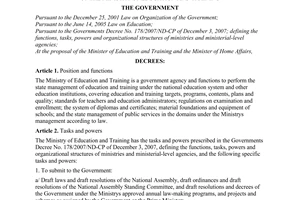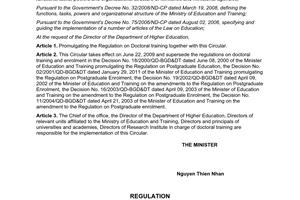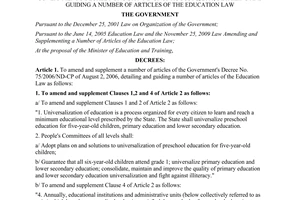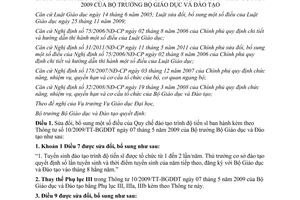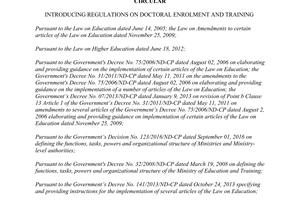Circular No. 05/2012/TT-BGDDT amendments No. 10/2009/TT-BGĐT đã được thay thế bởi Circular 08/2017/TT-BGDDTdoctoral enrolment and training và được áp dụng kể từ ngày 18/05/2017.
Nội dung toàn văn Circular No. 05/2012/TT-BGDDT amendments No. 10/2009/TT-BGĐT
|
MINISTRY OF
EDUCATION AND TRAINING |
SOCIALIST
REPUBLIC OF VIETNAM |
|
No. 05/2012/TT-BGDDT |
Hanoi, February 15, 2012 |
CIRCULAR
ON THE AMENDMENTS TO THE REGULATION ON DOCTORAL TRAINING PROMULGATED TOGETHER WITH THE CIRCULAR NO. 10/2009/TT-BGDDT DATED MAY 07, 2009 OF THE MINISTER OF EDUCATION AND TRAINING
Pursuant to the Law on Education dated June 14, 2005; the Law on the amendments to the Law on Education;
Pursuant to the Government's Decree No. 75/2006/ND-CP dated August 02, 2006, elaborating and providing guidance on the implementation of a number of articles of the Law on Education;
Pursuant to the Government's Decree No. 31/2011/ND-CP dated May 11, 2011 on the amendments to the Government's Decree No. 75/2006/ND-CP dated August 02, 2006, elaborating and providing guidance on the implementation of a number of articles of the Law on Education;
Pursuant to the Government's Decree No. 178/2007/ND-CP dated December 03, 2007 defining the functions, tasks, powers and organizational structure of Ministries and ministerial agencies;
Pursuant to the Government's Decree No. 32/2008/ND-CP dated March 19, 2008, defining the functions, tasks, powers and organizational structure of the Ministry of Education and Training;
At the request of the Director of the Department of Higher Education,
The Minister of Education and Training decides:
Article 1. To amend a number of Articles of the Regulation on Doctoral training promulgated together with the Circular No. 10/2009/TT-BGDDT dated May 07, 2009 of the Minister of Education and Training, in particular:
1. Clause 1 of Article 7 is amended as follows:
“1. Enrolment for doctoral training shall be held 1 – 2 times per year. The Director of the training institution shall decide the frequency of enrolments and the date of enrolment in the next year, and register them with the Ministry of Education and Training in every August”.
2. Appendix III to the Circular No. 10/2009/TT-BGDDT dated May 07, 2009 of the Ministry of Education and Training is superseded by Appendixes III, IIIa, and IIIb to this Circular.
3. Article 9 is amended as follows:
“Article 9. Requirements of foreign language skills of candidates
1. Every candidate must obtain one of the following qualifications in foreign languages:
a) A qualification in foreign languages equivalent to the level B1 or 3/6 according to the Common European Framework of Reference for Languages - CEF (Appendix III) issued by a competent testing center within 02 years before the enrolment date, or a qualification issued by a Vietnamese university that provide bachelor’s training in foreign languages which is equivalent to level B1 in Appendix IIIa. The format and requirements of the foreign language test are provided in Appendix IIIb.
b) A bachelor’s degree or master’s degree obtained overseas;
c) A bachelor’s degree in a foreign language.”
2. Based on the requirements of the doctoral training program, the Director of the training institution shall decide the foreign language necessary for each discipline, including the second foreign language applicable to the candidates for doctoral training in foreign languages.”
4. Clause 1 of Article 10 is amended as follows:
“1. The training institution shall issue the notice of enrolment at least 03 months before each enrolment.”
5. Clause 2 of Article 19 is amended as follows:
“2. Scientific researches must be conformable with the targets of the doctoral dissertation. The academic department and the instructors are responsible for organizing, providing equipment, and appoint staff to support postgraduate students in doing their researches. The academic department, instructors and postgraduate students are responsible for the truthfulness, accuracy, and novelty of their research findings, comply with the Vietnam’s and international regulations on intellectual property.”
6. Article 20 is amended as follows:
“Article 20. Doctoral dissertation
A doctoral dissertation must be a unique and creative scientific research done by the postgraduate student himself or herself, contribute theoretically or practically to the field of study, or provide new solutions valuable to development and growth of professional knowledge, or creatively resolve the issues for a profession or the actual socio-economic issues.”
7. Clause 5 and Clause 7 of Article 21 is amended as follows:
“5. The postgraduate students of whom the doctoral modules of doctoral subjects or dissertation proposals fail to meet the requirements of the training institution shall be dismissed from the doctoral training program” Any person without a master’s degree may enroll in and complete a master’s program to be awarded the master’s degree if he or she is admitted by a training institution that provide master’s training.”
“7. The Director of the training institution shall specify the teaching and assessment of doctoral modules, doctoral subjects, and dissertation proposals of postgraduate students; the conditions for keeping studying after the end of modules and dissertation proposals.”
8. Article 22 is amended as follows:
“Article 22. Requirements of skills in foreign languages before the dissertation defense
Before the dissertation defense, every postgraduate student must obtain one of the following qualifications:
1. a) A qualification in foreign languages equivalent to the level B2 or 4/6 according to the Common European Framework of Reference for Languages (Appendix III) issued by a competent testing center within 01 years before the date on which the application for dissertation defense at the grassroots level is submitted, or a qualification issued by a Vietnamese university that provide bachelor’s training in foreign languages which is equivalent to level B2 in Appendix IIIa. The format and requirements of the foreign language test are provided in Appendix IIIb.
2. One of the qualifications in Points b and c Clause 2 Article 9 of this Regulation.”
9. Clause 5 of Article 23 is amended as follows:
“5. The Director of the training institution shall consider allowing the early dissertation defense when the postgraduate student completes the training program and meet the conditions for dissertation defense according to Clause 2 Article 31 of this Regulation.”
10. Point dd Clause 1 of Article 25 is amended as follows:
“dd) Able to use foreign languages for professional research and international scientific exchange;”
11. Clause 4 and Clause 5 of Article 25 is amended as follows:
“4. Each instructor shall instruct no more than postgraduate students that are admitted in the same year at every training institution. A professor may instruct no more than 5 postgraduate students at the same time, an associate professor or doctor of science may instruct no more than 4 postgraduate students at the same time, a doctor may instruct no more than 3 postgraduate students at all training institutions, including postgraduate students instructed in cooperation and the postgraduate students allowed to defense their dissertations after the training period according to Clause 7 Article 23 of this Regulation.
5. When 2 postgraduate students of an instructor fail to complete their dissertation within 5 years from the day on which the instruction is assigned due to professional reasons, such instructor may not receive more postgraduate students.”
12. Point dd Clause 12 of Article 29 is amended as follows:
“dd) The decision on admission, the original transcript, the dissertation defense documents, the application for the doctorate degree, the decision to award the doctorate degree, the master register of diploma award shall be permanently kept at the training institution. Enrolment documents, training documents and other documents shall be kept for 5 years after graduation. Module exam papers, term essays, and dissertation proposals of postgraduate students shall be kept until they graduate. The destruction of expired documents shall comply with current regulations.”
13. Clause 2 of Article 30 is amended as follows:
“2. A doctoral dissertation consists no more than 150 A4 pages, not including Appendixes. Over 50% of which shall present the research result and ratiocination of the postgraduate student. A doctoral dissertation includes:
a) The introduction: brief introduction of the research project, the reason for choosing the project, the purpose, subjects, scope of study, scientific and practical roles of the project;
b) The abstract of the research: analysis and assessment of the research works closely related to the dissertation that are published in Vietnam and overseas, indicate the unresolved issues that the dissertation is about to resolve, targets of the dissertation, contents and methods of research;
c) The contents and research findings (one or multiple chapters): the theoretical foundation, arguments, and scientific hypotheses; research methods; research findings and discussions.
d) Conclusions and suggestions: present new findings and conclusions drawn from the research findings; suggestions for future researches;
dd) The list of the published works of the dissertation;
e) The reference list of the documents cited and used in the dissertation;
g) Appendixes (if any).”
14. Clause 7 of Article 30 is amended as follows:
“7. The primary contents and research findings of the dissertation must be reported at annual national science conferences and at least two articles are published in academic journals subject to peer review, marked by the State Professor Council, and enumerated in the list of academic journals made by the training institution. Postgraduate students are encouraged to have their articles published on reputable international academic journals enumerated at http://science.thomsonreuters.com/mjl/ or memoranda of International Science Conferences published by reputable international publishers.”
15. Points a and b Clause 2 of Article 31 is amended as follows:
“a) The dissertation and study program are completed and the requirements in Articles 17, 18, 19, 20, and 22 of this Regulation are met;
b) The dissertation meets the requirements in Article 20 and Article 30 of this Regulation and the regulations of the training institution. Dissertations shall be written in foreign languages if the training institution is able to establish a Dissertation Assessment Council in corresponding foreign languages;”
16. Clause 2 of Article 32 is amended as follows:
“2. The Grassroots Assessment Council consists of 7 members holding academic ranks and doctorate degrees, proficient in the field of study and the research project; at least 2 members among which are external scientists. The council includes a President, a Secretary, two reviewers and the Council members. Each Council member shall undertake a task of the Council. Excellent foreign scientists or Vietnamese scientists overseas are encouraged to act as reviewers in the Council.”
17. Clause 1 of Article 35 is amended as follows:
“1. The Institutional Assessment Council consists of 7 members. No more than 3 members of which are personnel of the training institution. Members of the Institutional Assessment Council are scientists holding titles of processors, associate professors, and doctorate degrees, having positive moral virtues; reputable; accomplished in the dissertations, having works relating to the fields of study of postgraduate students that are published over the last three years before being invited to the Council. At least 2 members are professors or associate professors; the members being doctors must have held their degrees for at least 36 months years by the day on which the Council is established.”
18. Points dd is added to Clause 2 of Article 36 is amended as follows:
“dd) The Institutional Assessment Council shall hold the meeting after obtaining at least 15 written remarks from the scientists in the same field of study that are enumerated in the list of recipients of the dissertation summary, and the remarks from all Council members.”
19. Points g is added to Clause 3 of Article 36 is amended as follows:
“g) The dissertation is disapproved by two Council members. In this case, the dissertation is considered unsatisfactory, and the dissertation defense shall not be held.”
20. The following sentence is added to the end of Clause 5 of Article 36:
“The Assessment Council shall be dismissed after the completion of the doctoral dissertation assessment.”
21. Article 40 is amended as follows:
“Article 40. Inspecting training documents and dissertation quality
1. In every last week of even months, the training institution shall send the Ministry of Education and Training the list of postgraduate students that do dissertation defenses over the last 2 months (the form in Appendix VI) together with postgraduate students’ profiles, including:
a) Copies of the Decisions to establish the Grassroots Assessment Council and the Institutional Assessment Council;
b) Copies of the minutes of meeting and Resolutions of all Council meetings;
c) Copies of reviews written by reviewers;
d) The information about new academic contributions of the dissertation (in both Vietnamese and English);
dd) The dissertation summary.
2. The training documents, the contents and quality of the dissertation shall be inspected in the following cases:
a) Random inspection: randomly inspect defended dissertations according to the report of the training institution;
b) Complaints or accusations against the training process, the contents and quality of dissertations are made.
3. At least 30% of the dissertations defended in the year shall be inspected. Within 10 days from the day on which the report from the training institution is received, the Ministry of Education and Training shall check the report and send a written notification of the dissertations that need inspecting and the inspection contents.
4. Documents of training inspection:
a) Applications for enrolment of postgraduate students according to Point c Clause 2 Article 10 of this Regulation;
b) Documents of the assessment and classification of postgraduate students made by academic committees, the summary of assessment results given by members of academic committees, and the rating given by the Secretariat of the Enrolment Council according to Clauses 2, 3 and 4 Article 14 of this Regulation;
c) Applications for dissertation defenses before the Institutional Assessment Council according to Clause 2 Article 33 of this Regulation;
d) The documents of the selection, seeking opinions, and processing opinions from peer reviewers according to Clause 5 Article 34 of this Regulation and the reviews of peer reviewers.
dd) Documents of doctorate degree award according to Clause 3 Article 43 of this Regulation;
e) Quantity: 01 dossier.
5. Documents of inspection of dissertation quality and contents
a) The doctoral dissertation without information about the postgraduate student, instructor, and training institution;
b) The dissertation summary without information about the postgraduate student, instructor, and training institution;
c) Copies of the articles that announce the research findings of the dissertation on academic journals;
d) Quantity: 03 dossiers.
6. The inspection dossier shall be sent directly or by post to the Ministry of Education and Training. Within 60 working days from the day on which the complete dossier is received, the Ministry of Education and Training shall inspect the dossier, the dissertation contents and quality, and send a written notification of the inspection result.
7. The training dossier is satisfactory if the regulations on enrolment, training organization and management, the procedure for dissertation in this Regulation are satisfied.
8. The dissertation contents and quality shall be inspected by seeking independent opinions from 3 scientists in Vietnam or overseas that hold professor or associate professor titles, doctorate degrees, are accomplished in the field of study and the dissertation topic, independent, experienced, objective, and honest. The dissertation is satisfactory when at least 2 assenting opinions are given.
9. When complaints or accusations against the dissertation contents or quality are made, or at least 2 dissenting opinions are given, the Ministry of Education and Training shall establish an Inspection Council and assign the Director of the training institution to hold the meeting of the Dissertation Inspection Council under the supervisions of representatives of the Ministry of Education and Training.”
22. Article 41 is amended as follows:
“Article 41. Dissertation Inspection Council
1. The Dissertation Inspection Council consists of 7 members, 4 of which must not participate in the Grassroots Assessment Council or the Institutional Assessment Council of the inspected dissertation. Members of the Dissertation Inspection Council are scientists in Vietnam or overseas that hold professor or associate professor titles, doctorate degrees, are accomplished in the field of study and the dissertation topic, have works relating to the dissertation topic that is published over the last 3 years before the Council is established, are independent, experienced, objective, and honest. The Inspection Council includes a President, a Secretary, and members. Instructors may not participate in the Dissertation Inspection Council.
2. Before the meeting, members of the Dissertation Inspection Council shall provide opinions about the imperativeness of the dissertation, the suitability for the discipline, the distinction of the contents and research findings of the dissertation and the published works; the truthfulness and transparency of the document citation; the layout and appearance; the contents, method, result, importance, and reliability of the results; the findings and new arguments of the dissertation; the achievements and weaknesses of the dissertation, the fulfillment of requirements for a dissertation.
3. The meeting shall be held when at least 6 members of the Council, including the President, the Secretary, and the members that give dissenting opinions (if any), are present. The Dissertation Inspection Council shall consider and evaluate the contents and quality of the dissertation, clarify the complaints or accusations; the opinions and conclusions given by independent inspectors. The Council shall make a detailed record on the opinions, discussions, and conclusion, and resolution on the contents and quality of the dissertation. A dissertation is satisfactory when it is approved by at least 5 Council members that are present.
4. If the dissertation is not satisfactory, the Director of the training institution shall hold a discussion between the Dissertation Inspection Council and the Institutional Assessment Council under the supervision of representatives of the Ministry of Education and Training. At least 12 members of both Councils shall attend the meeting, including the Presidents, reviewers, Secretaries, and members that give dissenting opinions of both Councils.
5. The Director of the training institution shall preside the discussion and appoint a secretary. Members of both Councils shall confer the contents and quality of the dissertation, and revote for the dissertation. The dissertation is satisfactory when it is voted for 3/4 of the Council members that are present. The discussion result is the ultimate result.”
23. Clauses 1, 2, 3 and 4 of Article 42 is amended as follows:
“1. For the accepted dissertations required to be revised by independent inspectors or the Inspection Council, the Institutional Assessment Council and the instructors shall consider and decide the revisions. After the postgraduate student finishes revising, the President of the Institutional Assessment Council shall check and verify the revisions, and request the Director of the training institution to award the doctorate degree to the postgraduate student in accordance with Article 43 and Article 44 of this Regulation.
2. For unsatisfactory dissertations:
a) If the doctorate degree has not been awarded, the postgraduate student may revise and redefend the dissertation according to Article 38 of this Regulation.
b) If the doctorate degree has been issued, it shall be dealt with in accordance with current laws.
3. The unsatisfactory training documents shall be supplemented by the Director of the training institution according to the notification from the Ministry of Education and Training. Administrative violations discovered shall be dealt with in accordance with current regulations on administrative penalties for violations against the laws on education.
4. Within 02 months from the day on which the inspection result is given, the training institution shall send a written report to the Ministry of Education and Training on the decision of the Director of the training institution according to Clauses 1, 2, and 3 of this Article, together with the report of the dissertation defenses in the next period (if any) according to Clause 1 Article 40 of this Regulation..
24. Clause 1 of Article 43 is amended as follows:
“1. The training institution shall consider awarding the doctorate degree to a postgraduate student when the following conditions are met:
a) It has been 3 months from the date on which the dissertation is successfully defended before the Institutional Assessment Council;
b) The contents of the dissertation are revised according to the Resolution of the Institutional Assessment Council, inspected and certified by the Council President, including the cases in Clause 1 Article 42 of this Regulation (if any);
c) The postgraduate student’s dissertation is not in the list of dissertations that need inspecting made by the Ministry of Education and Training according to Clause 3 Article 40 of this Regulation. If the dissertation is inspected, it must be satisfactory according to Clause 7 and Clause 8 Article 40 and Clause 3 Article 41 of this Regulation;
d) The postgraduate student has sent the National Library of Vietnam the dissertation, dissertation summary, a CD that contain the whole dissertation and dissertation summary (including the covers), including the classified dissertations and the dissertations related to National defense and security.”
25. The following sentence is added to the end of Article 45:
“When the documents and dissertation need inspecting during the settlement of complaints and accusations, the documentation and procedure for inspection shall comply with Clauses 4, 5, 6 and 9 of Article 40 and Article 41 of this Regulation.”
26. Clause 4 is added to Article 47 is amended as follows:
“4. Instructors that violate Article 25 and Article 26 of this Regulation, depending on the seriousness of the violations, shall not receive new postgraduate students, or be banned from instructing their current postgraduate students, or be banned from receiving postgraduate students for the next 3 years.”
Article 2. This Circular takes effect on April 02, 2012. The previous regulations at odds with this Circular are all annulled.
Article 3. The Chief of the office, the Director of the Department of Higher Education, Directors of relevant units affiliated to the Ministry of Education and Training, Directors and principals of universities and academies, Directors of Research Institute in charge of doctoral training are responsible for the implementation of this Circular.
|
|
THE MINISTER |
APPENDIX III
TABLE OF REFERENCE FOR SOME QUALIFICATIONS IN FOREIGN LANGUAGES EQUIVALENT TO LEVEL B1 AND LEVEL B2 OF CEF
(for evaluating the proficiency in foreign languages during recruitment and before graduation)
(to the Circular No. 05/2012/TT-BGDDT dated February 15, 2012 of the Ministry of Education and Training)
English
|
Level (CEFR) |
IELTS |
TOEFL |
TOEIC |
Cambridge Exam |
BEC |
BULATS |
|
B1 |
4.5 |
450 PBT 133 CBT 45 iBT |
450 |
Preliminary PET |
Business Preliminary |
40 |
|
B2 |
5.5 |
500 BPT 173 CBT 61 iBT |
600 |
First FCE |
Business Vantage |
60 |
(The marks above are minimum requirements)
Some other languages
|
Level (CEFR) |
Russian |
French |
German |
Chinese |
Japanese |
|
B1 |
TRKI 1 |
DELF B1 TCF niveau 3 |
B1 ZD |
HSK Level 3 |
JLPT N4 |
|
B2 |
TRKI 2 |
DELF B2 TCF niveau 4 |
B2 TestDaF level 4 |
HSK Level 4 |
JLPT N3 |
Notes: The training institution shall seek opinions on the equivalence of other uncommon international qualifications from The Ministry of Education and Training.
APPENDIX IIIb
FORMAT OF THE
FOREIGN LANGUAGE TEST EQUIVALENT TO LEVEL B1 AND LEVEL B2 OF CEF APPLICABLE TO
DOCTORAL TRAINING
(to the Circular No. 05/2012/TT-BGDDT dated
February 15, 2012 of the Ministry of Education and Training)
I. Format of the B1 test
A test consists of 3 sections. Total duration: 135 minutes.
SECTION 1: READING AND WRITTING
Duration: 90 minutes Score: 60/100
Description:
READING: 4 tasks/20 questions (30 points)
- Task 1: 10 questions (10 points). Read 10 separate sentences. 1 word of each sentence is omitted. Select 1 correct word out of 4 words provided (quiz) and fill it in the blank. These blanks test the understanding of grammar, vocabulary, comprehension, social and cultural knowledge.
- Task 2: 5 questions (5 points). Select 1 of the two exercises: 1) Read 5 usual billboards or signboards shown in everyday life (images without text or with very few text) or short notices, then select 1 correct answer out of for answers provided (quiz); 2) Read 5 passages (each passage consists of 3 sentences), then select 5 pictures corresponding to the passages which relate to everyday life.
- Task 3: 5 questions (5 points). Read a text composed of 200 – 250 words, then decide whether the answers are True or False, or select a correct answers out of 4 answers provided. This text may be extracted from comprehensible and everyday newspapers or magazines.
- Task 4: 10 questions (10 points). Do the Cloze test. Notes: Only remove words from the third sentence. The first and second sentences must be complete for the examinees to understand the context. This text is composed of 150 words, 10 words among which are removed. Select them from 15 provided words.
General requirements: 1) The text is coherent and uses simple language; 2) The topics are familiar and connected with everyday life (extracted from newspapers, magazines, textbooks, stories, encyclopedias, etc); 3) The amount of vocabulary does not exceed 10% of level B1.
WRITING: 2 tasks (30 points)
- Task 1: 5 questions (10 points). Paraphrase 5 provided sentences using 1 – 2 suggestive words.
- Task 2: 20 points. Write a short text composed on 100 – 120 words. This text is connected with everyday life, usually based on provided materials. Some common tests: write a job application after reading a want-ad; write an invitation or a complaint about a product or service that was purchased after reading an advertisement; fill in a form that consists of 2 passages, each passage includes 4 – 5 lines; write 2 – 3 messages via emails, each message consists 4 – 5 lines; write a letter to express gratitude or apology or explanation for a circumstance, or to give advice or recommendation; write a story from a provided opening sentence and ending sentence, etc.
SECTION 2: LISTENING
Duration: 35 minutes. Score: 20/100 points
The Listening test consists of 02 tasks:
- Task 1: 5 questions (10 points). Listen to 5 short conversations and mark 4 correct pictures; or listen to a long conversation and decide whether the 5 answers are True or False; or listen to a monologue then mark 5 items/facts.
- Task 2: 10 questions (10 points). Listen to a conversation or a monologue. Fill in 10 blanks in the test. The blanks usually leave out important information.
General requirements: 1) Each examinee has 5 minutes to listen to the instructions, then listen to each track twice and answer the questions simultaneously; 2) Each track must not exceed 15 minutes (including the answering time); 3) the pronunciation must be clear, the speed is slow or medium; 4) The topics and the contexts must be familiar and connected to everyday life;
SECTION 3: SPEAKING
The Speaking section consists of 3 tasks. The time limit for each examinee is 10 – 12 minutes.
Score: 20/100 points
Description:
The examine shall draw 1 out of 14 topics at level B1 that are related to personal, public, professional, educational issues, such as: personal information, accommodation, family, environment, everyday life, entertainment, recreation; traveling, tourism; relationship with other people; health care; education; trading; foods and beverages; services; locations; languages; weather.
The preparation duration is 5 – 7 minutes (not included in the answering period).
- Task 1 (2 – 3 minutes): the examiner shall ask the examinee some questions about his or her personal information to assess the examinee’s communication skills.
- Task 2 (5 minutes): The examinee shall make a presentation on the drawn topic. The presentation must be coherent, contain the introduction, idea development, and conclusion with the use of cohesive devices. Avoid enumeration without substantial development of every idea.
- Task 3 (3 – 5 minutes): the examiner and the examinee shall hold a conversation to expand the issues related to the presented topic. During the conversation, the examiner shall raise opposing or exploratory questions, and the examinee must express his or her opinions and present arguments to defend such opinions
II. Format of the B2 test.
A test consists of 4 section. Total duration: 235 minutes.
TASK 1: READING AND COMMAND OF LANGUAGE
Duration: 90 minutes. Score: 30/100 points
Description:
- Task 1: 5 questions (5 points). Read a text and answer 5 quiz questions. A text composed of 100 – 150 words might be a table, advertisement, letter, commercial form, flier, notice, news, schedule, plan, etc. (might be illustrated by pictures, diagrams, or graph).
- Task 2: 5 questions (5 points). Read a text composed of 5 paragraphs of which the order has been changed. Rearrange the mixed sentences/paragraph in a correct or logical order. The text might be an article, report, etc. related to public, professional, or educational issues.
- Task 3: 5 questions (5 points). 5 quiz questions (4 choices each) are provided. The examinee shall quickly read and choose the correct answer. The text is composed of 200 – 250 words. It might be extracted from an article, report, schedule, plan, news, weather report, etc. related to public, professional, or educational issues.
- Task 4: 15 questions (15 points). 15 separate questions about use of language. Choose correct answers for the removed words. These blanks test the understanding of grammar, vocabulary, comprehension, social and cultural knowledge.
General requirements: 1) The language used in the text may be concrete of abstract, may contain professional concepts or knowledge at an average level that are comprehensible to laymen at level B2; 2) The amount of vocabulary shall not exceed 10% of level B2.
SECTION 2: WRITTING
Duration: 90 minutes. Score: 30/100 points
The Writing test consists of 3 tasks:
- Task 1 (10 points): Do the Cloze Test. Notes: Only remove words from the third sentence. The first and second sentences must be complete for the examinee to understand the context. The examinee shall choose 10 words out of 15 provided words to fill in the blanks.
- Task 2 (10 points): this test has two forms: 1) Write 10 sentences about particular circumstances. Some words or phrases may be provided together with the circumstance to form a complete letter, notice, or article. 2) Read a provided text, and then write a short passage composed of 10 – 15 sentences. The text may be a reply to a business letter, personal opinions about an issues on a newspaper or magazine that are shared to other readers, or a short report on the finished works, etc.
- Task 3 (10 points): Choose one of three topics to write an essay (200 – 250 words). The essay must be coherent and contain an introduction, a body, and a conclusion. The body consists of 2 – 3 main ideas. Those ideas must be clearly and coherently developed using logical arguments, examples, or date, etc. The examinee must use cohesive devices; avoid enumeration without developing every idea.
SECTION 3: LISTENING
Duration: 40 minutes Score: 20/100 points
The Listening test consists of 3 tasks:
- Task 1: 5 questions (5 points). Forms of the listening test: 1) Listen to 5 short separate conversations and answer 4 quiz questions; 2) Listen to a monologue and decide whether the 5 answers are True or False;
- Task 2: 5 questions (5 points). Listen to 5 conversations or monologues that are extracted from the same track, then decide whether the answers are True or False or answer the quiz questions.
- Task 3: 10 questions (10 points). Listen to a long conversation or a monologue. Fill in 10 blanks that leave out important information of the test. The contents should be related to familiar issues or professions or fields of study that laymen can understand.
General requirements: 1) An examinee has 5 minutes to listen to the instructions, then listen to each track twice and answer the questions simultaneously; 2) the pronunciation must be clear, the speed is slow or medium; 3) The topics must be specific and familiar. The contents related to professional knowledge should not so deep so that laymen at level B2 can understand; 4) The amount of vocabulary must not exceed 5% of level B2.
SECTION 4: SPEAKING
The Speaking test consists of 3 tasks: Duration: 15 minutes for an examinee.
Score: 20/100 points
The examine shall draw 1 out of 14 topics at level B2 that are related to personal, public, professional, educational issues, such as: personal information, accommodation, family, environment, everyday life, entertainment, recreation, leisure time, traveling, tourism; relationship with other people; health care; education; trading; foods and beverages; services; locations; languages; weather.
The preparation duration is 5 – 7 minutes (not included in the answering period).
- Task 1 (2 – 3 minutes): the examiner shall ask the examinee some questions about his or her personal information to assess the examinee’s communication skills.
- Task 2 (5 - 7 minutes): The examinee shall make a presentation on the drawn topic. The presentation must be coherent, contain the introduction, idea development, and conclusion with the use of cohesive devices. Avoid enumeration without substantial development of every idea. The examinee must prove his or her rich vocabulary, the ability to use accurately a wide range of grammatical structures, and the fluency.
- Part 3 (3 – 5 minutes): the examiner and the examinee shall hold a conversation to expand the issues related to the presented topic. During the conversation, the examiner shall raise opposing or exploratory questions, and the examinee must express his or her opinions and present arguments to defend such opinions.
------------------------------------------------------------------------------------------------------
This translation is translated by LawSoft,
for reference only. LawSoft
is protected by copyright under clause 2, article 14 of the Law on Intellectual Property. LawSoft
always welcome your comments
